“Transfigurations”
Written by René Echevarria
Directed by Tom Benko
Season 3, Episode 25
Production episode 40273-173
Original air date: June 4, 1990
Stardate: 43957.2
Captain’s log: The Enterprise is scanning the Zeta Gellis cluster. They pick up a ship that crashed on one planet, with one survivor with fading life signs. Riker leads a team that includes Data, Crusher, and La Forge. The survivor has suffered severe brain damage, and is only made stable enough for transport after Crusher temporarily links his nervous system to La Forge’s. She beams him back and manages to save him, though the brain damage has left him amnesiac. Crusher is barely willing to take credit for his recovery, as he has spectacular healing processes. What concerns her are the cells that have nothing to do with his injury that are also mutating.
Riker was only able to salvage a storage capsule from the pod, and there is debris in orbit that indicates a ship that was destroyed by energy-weapon fire.
Within 36 hours, the patient—whom Crusher has dubbed “John Doe”—is no longer in critical care. Within a month, he is able to walk, albeit only across the room, slowly, with assistance from synaptic induction bands. But he still has bouts of pain and his cells are still mutating.
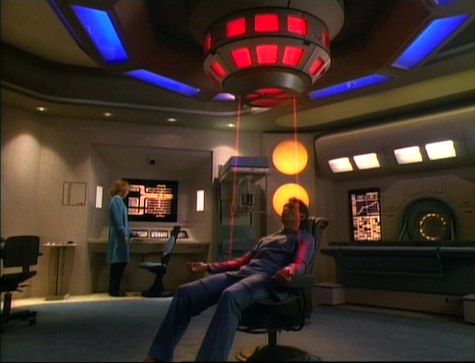
A few days later, he’s walking around on his own. When O’Brien comes in with a disloacted shoulder from kayaking on the holodeck, John instinctively touches O’Brien’s shoulder, which heals it. He has no idea how he did this.
Data and La Forge have been struggling to figure out how to read the information in the storage capsule. La Forge hits on scanning the molecular structure of the capsule itself, which turns out to be navigational data. They’re able to extrapolate it against existing astronomical data to project his course back. It’s a star system they’ll arrive at in three weeks over the course of their normal mission.
When Picard shares this with John, he is adamant that he not return home. He still doesn’t have his memories back, but he knows that “we” were trying to escape their home—the first revelation that there were others with him. He can’t recall why, but he knows he can’t go back home.
A ship shows up on long-range sensors heading straight for them at warp 9.72. They don’t respond to hails, and will intercept the Enterprise in ten hours.
John continues to have bouts of pain, accompanied by a glow across his chest. After one particularly nasty attack, he is overwhelmed by the need to leave the ship. He runs out of sickbay and heads to a shuttle bay. While Worf is attempting to restrain him, he glows again—so much so that the glow knocks Worf over the railing and onto the deck below, breaking his neck. John is able to heal Worf the same way he healed O’Brien. He can’t explain exactly why he tried to steal the shuttle, but he has a tremendous urge to get away—not least because he doesn’t want to hurt anyone else.
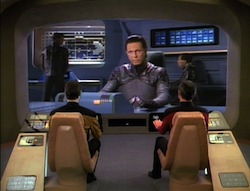 The alien ship arrives. Its shipmaster, Commander Sunad, identifies himself as Zalkonian, and John as a criminal whom they thought was dead with the other three criminals he escaped with. John recognizes Sunad as someone he doesn’t trust. Troi adds that Sunad and all the Zalkonians on his ship are scared to death of John.
The alien ship arrives. Its shipmaster, Commander Sunad, identifies himself as Zalkonian, and John as a criminal whom they thought was dead with the other three criminals he escaped with. John recognizes Sunad as someone he doesn’t trust. Troi adds that Sunad and all the Zalkonians on his ship are scared to death of John.
John is willing to surrender to Sunad to protect the Enterprise, but he also believes that there’s more at stake here.
Picard tries talking to Sunad, but he refuses to accept Picard’s words and attacks the Enterprise with a Super Suffocation Weapon (seriously, he pushes a button, and everyone on the Enterprise can’t breathe). John is able to heal everyone on the ship from that weapon, but Sunad just arms conventional weapons. John, however, remembers everything now, because it’s television, and amnesia always goes away at the episode’s climax. His powers enable him to transfer Sunad from his own bridge to the Enterprise bridge, and then he explains: the Zalkonians are on the verge of a metamorphosis into beings of energy, but Zalkonian society views them as diseased, insisting that the transfiguration will kill them. They’ve gone so far as to kill anyone showing signs of the mutation. John is the first to achieve the change, which he does in front of everyone, turning into an orange-y glow-y being.
After Sunad refuses to let John near him as an orange-y glow-y thing, John sends him back to his ship and he buggers off as fast as he can. John thanks Picard and Crusher and then disappears in an orange-y glow-y ball of light to live happily ever after.
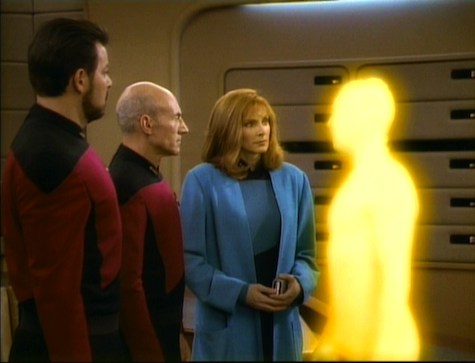
Thank you, Counselor Obvious: Troi points out the anger Sunad has for John, which even she states is obvious, and then adds that they feel fear as well. She also plays devil’s advocate (along with Riker) when discussing what to do with John, pointing out that the Zalkonians are genuinely confused as to why Picard is even hesitating to turn John over.
If I only had a brain : A missed opportunity: Data was the only one not affected by Sunad’s Super Suffocation Weapon. Might’ve been cool to have John’s healing not work on that, and have Data and John go against Sunad all by themselves.
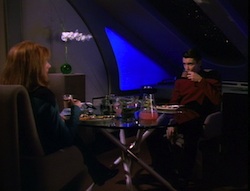 The boy!?: Wes—in his shiny new red uniform—only has two scenes, but one is a charming-as-all-heck dinner with his mother and he and Crusher discuss John.
The boy!?: Wes—in his shiny new red uniform—only has two scenes, but one is a charming-as-all-heck dinner with his mother and he and Crusher discuss John.
No sex, please, we’re Starfleet: La Forge goes from thumphering like a moron in the presence of Christy Henshaw to necking with her in a turbolift. One hopes that when he takes her to the holodeck, he has better programs this time. The change between those two events is the neural link he and John shared, which had a positive effect on his confidence.
Crusher and John also develop a close friendship that really feels like a romance. In the dinner scene with Wes, Crusher talks out all the pitfalls and dangers and confusions and whatnot involving doctors getting close to their long-term patients. (John basically lives in sickbay for more than a month.)
There is no honor in being pummeled: Worf tries (and fails, see below) to advise La Forge on how to pick up women, and then later takes credit for his greater success with Christy. He also is killed and resurrected by John.
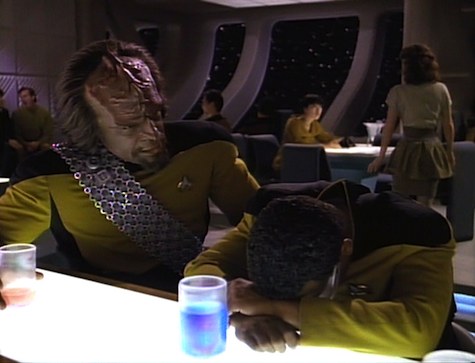
I believe I said that: “You must let her see the fire in your eyes.”
“But what would I say?”
“Words come later. It is the scent that first speaks of love.”
“Thanks, Worf. That helps a lot.”
Worf giving La Forge the worst advice ever (you can’t see La Forge’s eyes, and humans don’t have the olfactory capacity of Klingons), and La Forge sarcastically expressing gratitude
Welcome aboard: As I’ve said before in this here rewatch, romance-of-the-week episodes like this rise and fall on the backs of the guest stars, from spectacular success like Suzie Plakson’s K’Ehleyr to dismal failure like Matt McCoy’s Devonani Ral. Mark LaMura’s John Doe isn’t quite as transcendent as Plakson, but he’s pretty darn good, with tremendous charm and gravitas, and an excellent rapport with Gates McFadden. (He pretty much sold me when he first starts walking after overconfidently stating he was ready to go, then stumbling badly after one step. Crusher says they should proceed again more slowly, and John mutters, “Much more slowly.” It’s a lovely moment.)
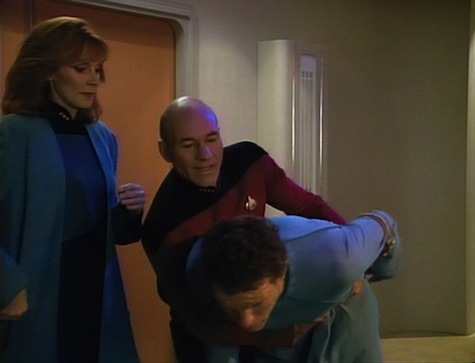
Julie Warner reprises her role of Christy Henshaw from “Booby Trap,” and this time things develop more pleasantly between her and La Forge. (Warner joked in an interview once that she was cast because she’s shorter than LeVar Burton; they were willing to have an interracial relationship, but not one where the woman was taller than the man, a challenge when casting for someone alongside the 5’7″ Burton.)
Charles Dennis sneers a lot as Sunad. We also get our first nurse with a speaking part in Patti Tippo’s Nurse Temple.
Trivial matters: This is the second script by Echevarria, following “The Offspring.” His position on the writing staff was solidified after this episode.
Sunad was named after story editor Richard Danus. (Spell it backwards….) Nurse Temple is a play on Nurse Chapel from the original series (played by Majel Barrett).
The scene with John transformed into an orange-y glow-y thing was done with minimal post-production work—LaMura actually wore a fluorescent orange suit that glowed on the special film they used to shoot the scene.
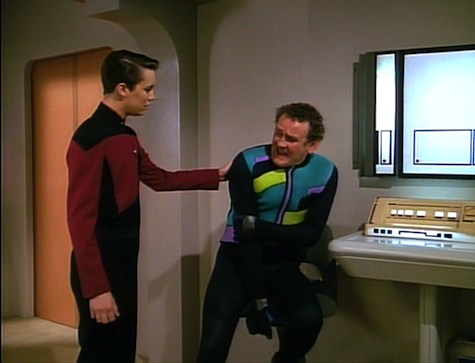
O’Brien’s love of kayaking, and his tendency to throw out his shoulder while doing so, will continue to be a recurring theme on Deep Space Nine.
This episode has the longest in-episode time span since “Pen Pals,” which also took approximately six weeks.
Make it so: “Less talk. More synthehol.” A perfectly delightful little episode. It’s especially nice to see a case where magical 24th-century medicine doesn’t fix everything immediately. The plot is fairly standard, but it proceeds at a nice, leisurely pace. Things happen slowly, not because the episode drags, but as a natural outgrowth of the story. Plus it’s nice to see the crew taking leisure: Wes and Crusher’s dinner, O’Brien’s kayaking, La Forge and Worf sharing drinks in Ten-Forward, La Forge dating Christy, and so on. And I have to admit to really getting a kick out of Sunad’s complete lack of interest in establishing relations with the Federation. Not all new life and new civilizations actually want to be sought out, after all. The Super Suffocation Weapon was also kinda awesome.
Mostly what makes it work, though, is a fine performance by Mark LaMura. He’s incredibly charismatic and likeable, which helps complicate Picard’s decision later on as to whether or not to turn him over to Sunad.
The one downside of the leisurely pace is that it makes the rushed ending all the more frustrating. We find out the truth about the Zalkonians in a rushed exposition dump from John, and then it’s over.
Warp factor rating: 7
Keith R.A. DeCandido wants to know what love is. He wants you to show him. He also wants to make note of the fact that “Transfigurations” is an incredibly difficult word to type when you touch-type, and you should all feel really really sorry for him. Also? Buy his books….










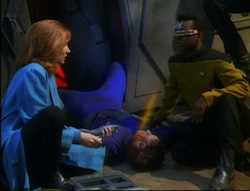
Owing to the fact that he Force-choked the entire Enterprise crew, they should have named Sunad “Redav” instead (Vader spelled backwards).
I agree that there are good moments here, but I grow tired of aliens with mondo super powers (except the Q). Especially ones that turn into orang-y glow-y balls of light (or in this case bi-pedal, walking, talking light bulbs). Matt LaMurra’s performance was very good and that alone saves this episode from being a bad one. All in all, though, I consider “Transfigurations” run-of-the-mill TNG.
@krad, where on Earth did you come up with a word like thumphering? Catchy…
I don’t think Worf’s advice is all that bad, even if the specifics don’t work for humans. He’s just trying to say that Geordi’s losing the game before he even opens his mouth — he needs to show women that he’s passionate about them instead of awkwardly saying, “Garsh, Ms. Hanson, you sure are purty. Wanna go hold hands on the holodeck then retire to my quarters to review technical manuals?”
I remember enjoying this episode. I will say that as I read Keith’s plot summary, it made me think, “gee, this reminds me a bit of the Jon Pertwee story, “The Mutants” from “Doctor Who” (which I also happen to have liked). That story also ended with an alien transforming into an energy being after being persecuted by the authorites. (The “Trek” version has a slight visual effects edge.)
The advice given to would-be writers for the series was always “concentrate on the characters,” and this episode certainly is a textbook example of how to do that. One could argue that the pace gives the audience a last episode to breathe before the intensity of “The Best of Both Worlds.”
Wes for the win in this episode. Put your hand on the dislocated shoulder. O’Brien not feeling pain anyways.
Synaptic Induction Bands, another good Trek idea that shows up for one episode then disappears.
‘The Super Suffocation Weapon was also kinda awesome.’ Yes, it was. John Doe saving the crew that quickly seem to kill its awesomeness.
Sudan’s total disinterest in the Federation and kill everyone with the mutation made him a bit of a fanatic. It is a shame that he didn’t come back as a repeatable villian with a large chip on his shoulder for ‘Captain Pickles’, Dr Crusher and the Federation.
@@.-@: “Synaptic Induction Bands, another good Trek idea that shows up for one episode then disappears.”
They were used again in “Ethics” as part of Worf’s rehabilitation from his spinal injury. They were actually called motor assist bands or units; synaptic induction was a technique Picard suggested for restoring John’s memories, but Crusher said it wouldn’t work because his neural network conformed to no known pattern.
While I’m not fond of the “people evolving into glowy energy beings” cliche of sci-fi, which is both thinly veiled mysticism and a complete misunderstanding of how evolution works, I did like the way it was handled here, as the basis for an allegory on intolerance. And yes, it was one of TNG’s better romance stories too.
And it is very cool how they did the special effect for glowy orangey John.
I did find the use of the “John Doe” alias to be a bit too 20th-century. Indeed, I know now that it’s even more parochial than I thought, since the “John Doe” placeholder name is mainly an American and Canadian usage; even though it originated in England around the 14th century, it’s been obsolete in the UK for over 150 years. (Apparently the rest of the Anglophone world uses “Joe Bloggs,” and other countries have their own equivalents.) It just screams “These are fictional characters written by and for 20th-century Americans” rather than “These are members of a futuristic, multicultural, multispecies civilization.”
Christopher: I think they should have called him “Fred.”
Also to Christopher: thanks for your comment in “Pen Pals” about the duration of time in the episode, which is what made me think of mentioning it here.
—Keith R.A. DeCandido
Double post, sorry…..
John Doe’s white jumpsuit is really awesome. I bet it’s super comfortable and not embarrassing to wear at all.
I love how in the picture at the top of the article it looks like John Doe is spitting at La Forge…..
—Keith R.A. DeCandido, who doesn’t pick the photos, mainly because Chris is awesome at it
@6: “I think they should have called him ‘Fred.'”
After looking at the links in Wikipedia’s “John Doe” article, I’m thinking maybe they could’ve called him “Nomen Nescio” (Latin for “I do not know the name”), which is a fairly generic “John Doe” equivalent used since Roman times. Still a bit Western-centric, but not quite so linked to a specific culture and era.
Krad,
Love is…
Seeing a ship flying thru space
Knowing warp speed can bypass hyperspace
Puking on eggs except for that klingon
Fighting the borg with nothing to lean on
Seeing the upside to skintight Clothes
Falling in love with a damn sexy nose
Regaining humanity with the help of an android
Always exploring that black starry void
Learning to rhyme and learning to reason
Learning weird metaphors for every season
Winning the battle for price of a game played
Watching the stories where beloved heros are made
Seeing the galaxy fall under trial and tribulation
Viewing the dark side of our dear federation
Able to explore all that we dont know
Able to engage and just boldly go.
(i kind of jumped around the whole series. Forgive my five minutes to write poetry; it was fun)
@9. Thanks, Keith! Our prod. assistant Emily gets the kudos for the pics in this one, though, and she did a bang-up job. In particular, the one of LaForge and Worf in Ten Forward had me on the floor.
I liked this episode, but it fits into a pattern for Star Trek, in which aliens gaining extra abilities and powers is generally a good thing, but humans gaining extra abilities is always bad. After a while, the pattern begins to grate…
Nomen Nescio would’ve been good.
Fred would’ve been better.
—Keith R.A. “Fred” DeCandido
I generally give that a 6.
Not a bad episode, but once I saw BoBW (part 1), I always got this vibe watching this episode afterward that the principals were holding back a bit, like they were preparing themselves for the season finale. Maybe that’s me projecting, but there it is.
@11, If nobody else is going to mention it, I’ve got one thing for you.
Will you marry me? I’m entirely semi-serious.
Seeing the crew take some leisure time is especially effective in retrospect. We know what’s coming next.
I loved this episode. Its a nice quiet episode that is a nice contrast for the next episode. This episode ultmately had the core principle of Star Trek: seeking out new life forms. John’s remebering everything and then departing is handled well in my opinion. John remembers his reason for being and can’t just hang around the Enterprise, tempting though I’m sure it may have been in light in his rapport with Crusher. The ending is heartfelt and sad, but beautiful, especially accompanied by the beautiful score as John flies out the dome and into space. I agree with Keith on the 7 rating.
Ten hours at Warp 9.72? How much distance would be covered? Just how far do the Enterprise sensors reach?
Minor quibble, but a few episodes ago Data’s daugher Lal delivered one of the most emotionally poigant lines of the season with “Thank you for my life.” That same line was recycled here with John saying it to Crusher. Same writer, and as krad notes, this was his second script for TNG. It’s a great line, but to recycle it so soon and so obviously is a bit much. (He even paraphrases it again in John’s closing lines.) I think Julie Warner is just the cutest thing in the galaxy, although when I saw her (as Henshaw) with Giordi I couldn’t help thinking that she was cheating on Tommy Boy. Love the scene with Worf making disgusted faces listening to Giordi getting his geek on instead of cruising babes, then ending it with the “Less talk, more synthahol” punchline. Finally, @8 – completely agree! Just watching that scene made me want to readjust my boys…
Yeah, I felt the conflict wasn’t really there, due to the rushed ending. I think they could have sped up a few things and gave it more time.
I found this one pretty dull largely because of the guest character and because it’s too easy to describe it as “the Enterprise meets Space Jesus”.
To spell it out, ‘John’ is persecuted as a criminal for being disruptive to society, heals the sick, raises the dead, transcends his body, and predicts that now that this has happened it is inevitable that others will follow him and cause great change in their society.
It all comes off as very hokey to me. So much so the point it explicitly makes about the kindness of the Enterprise crew vs. the stiff and cruel Zalkonians gets lost.
Curses to krad for explaining the glow-y John effect; now I can’t stop starting at folds in the fabric at the top of the actor’s head!
@24 Yes, my feelings exactly. Bit of a dull episode that had a lot of quite terrible things in it, like Space Jesus and Geordi getting more confident with women thanks to some (almost literal) Deus Ex Machina type thing. It also bugged me how it shows that being more confident must automatically equal success with whoever you like. I think the only thing I really enjoyed about it was the actress that played Geordi’s love interest being very attractive.
I feel like they perhaps thought they could get away with putting a bit of a clanger here since everyone would be back next week for the finale even if this episode was just 45 minutes of space paint drying.
This episode is so-so. I liked that so much time passed during the mission that viewers saw more of the day-to-day life on the Enterprise. But the plot is ultimately just kind of boring.
The episode also loses points for being the main example that I always remember of a phenomenon that drove me nuts when first watching the show in the 90s: every alien race they encounter is a match for the Enterprise and more advanced than the Federation. These random xenophobes in an obscure part of the galaxy have a ship that is equal to the Enterprise (according to Worf) and has a weapon that would have killed the crew (through the shields no less) without John’s intervention.
The Enterprise is supposed to be the most advanced Federation ship every created and the Federation is supposed to be this part of the galaxy’s premier power, yet it seemed every third episode during seasons 3 and 4 (in particular) some random alien race of the week was more than capable of blowing them away effortlessly. Just lazy writing and world building. I loved the few episodes that came along that showed the Enterprise as it was supposed to be: one of the most advanced ships around (I particularly like the beginning of The Wounded, showing a Cardassian cruiser’s weapons as being basically a joke compared to a Galaxy-class starship; even the Phoenix outclasses the Galors in the episode by quite a lot).
Anyway, sorry for the rant.
The part with Christy Henshaw has always driven me crazy; in this episode they act like schoolkids that like each other but are too afraid to talk to one another, yet just a few episodes earlier they actually went on a date and Christy told him she didn’t have feeling for him.
Absurdly incongruous.
This episode has always annoyed me due to the erroneous depiction of evolution. It’s as bad here as in “Genesis” or “Threshold.” Again, individuals don’t evolve! But I loved Mark LaMura on “All My Children” and he was great here.
Perhaps I’m a bit prudish, but the entire dinner scene between Dr. Crusher and son was (for me) incredibly uncomfortable. To think of your mother in any role other than that of maternal figure is just Oedipal and wrong. Let me here also acknowledge that it takes maturity to come to terms with recognizing that your parent is a vulnerable, multi-faceted person with your same basic needs and desires – romantic or otherwise. STILL . . . yucky.
It doesn’t help that Wil Wheaton discusses his character’s mother’s would-be romance with his dopey, why-don’t-you-go-ahead-and-punch-me-in-the-teeth grin plastered on his dumb face (Sorry. Personal venting.) “Gee Ma, do ya think he’ll let me call him ‘Daddy’?”
Additionally, Mark LaMura doesn’t hold a candle (or a glowing orange body suit, for that matter) to Sir Patrick Stewart. Forget the flavor of the week guy, Beverly; keep chipping away at Picard’s facade of emotional aloofness and professional detachment. It’s worth the effort.
Cory: You are, of course, entitled to feel how you feel, but I must agree with your initial conditional that you’re prudish. Wes is an adult at this point and, more to the point, Beverly is also a human being. To think of your mother only as a maternal figure is, frankly, limiting and unfair to the mother in question. People are more complicated than that, and to reduce one’s mother to only being maternal under all circumstances is something that I find yucky. A parent and child should be able to talk about any subject, particularly once they’re both grownups.
—Keith R.A. DeCandido
Keith,
Thank you for your response to my post. I very much appreciate your ‘rewatches’ of my all-time favorite show. Re-reading my comment makes me think that I ought to just keep my mouth shut when in an emotionally charged frame of mind in the middle of the night . . .
I apologize for being “prudish” (perhaps “limited” would be more accurate) with regards to certain interpersonal relationships. Also, “Oedipal” really isn’t analogous to this situation, so I regret having tossed that in there (sleep deprived = mentally deprived).
Again, thank you for being a great reviewer and for respectfully acknowledging my feeble attempt at commenting.
P.S. Totally random, but it just occurred to me that Geordi waited like three months before thanking “John” for inadvertantly instilling a new-found confidence in him. Admittedly, this is meant to be a self-contained 45 minute story for the viewing audience, but within the timeline set forth in the episode itself it strikes me as odd and unlikely that Geordi would wait that long to thank him.
Cory: thank you for commenting, and please feel free to continue doing so! The articles are me, but the comments are a dialogue. :)
Having said that, you have nothing to apologize for. We disagree, is all. You have every right to your opinion, and I have every right to disagree with you. Long as we remain civil about it…………………
—Keith R.A. DeCandido
One nitpick I noticed watching this episode again, when John transports Sunad onto the Enterprise bridge, there is literally no reaction from the other Zalkonians. They sit at their stations totally oblivious to their commander being snatched away, it’s really weird…
John looks like he’s auditioning for Cocoon at the end there. Couldn’t John’s healing powers do the same for his memory as well? Or is that why it finally came back to him by the end? 26: It seems to me that a lot of the races the Enterprise encountered were greatly outclassed and the Zalkonian ship was a welcome change. Had it not been for John, the crew surely would have died at the hands of Sunad’s very effective weapon. 27: People have been known to change their minds, if you give them a reason to. 29: As Beverly’s patient, she shouldn’t even be considering a relationship with John. But once he completes his transformation, that nails the lid on that coffin forever. 31: It was more like six weeks but point taken. Imagine if it had been Barclay instead (maybe it gave them the idea for The Nth Degree).
This is another one those episodes where everything Crusher does that annoys me gets magnified through the lens of the loathing I had for her in Higher Ground. So because John makes her feel all warm and funny down there she loses all sense of objectivity and would put everyone at risk regardless.
Worf, in a moment of remarkable restraint, confronts John and tells him he doesn’t want to hurt him but he has to return to sickbay. Without Worf moving even a centimeter closer, John then morphs into the glow thingy and essentially kills him. Crusher sees the whole thing, yet two minutes later, after both John and Picard clearly agree and understand that John is a threat regardless of whether he means to be or not, Crusher literally says: “John I don’t believe you’re capable of hurting anyone”, in that dreadful sing-song voice she gets when she’s all hot and bothered.
Then a little while later they’re in the boardroom discussing whether to turn John over to his own, and as soon as John leaves Crusher starts to say “Captain you can’t seriously be considering…” and Picard sternly interrupts her and reminds her that all options have to be considered, notwithstanding her boy crush. It’s a good thing he didn’t know how to doodle pretty pictures in a notebook or I’m sure she would have sabotaged the Enterprise to save him if necessary.
So yes, admittedly I am incapable of being objective about that character now, but it’s kind of fun to find fault with her as the opportunity seems to arise so often. Even without that, I wouldn’t rate this a 7, more like a 3 for me, as I found the pacing slow and the performances generally wooden. Especially the bad guy. Loved it when he got beamed over and he says “Kill him Captain, he’s evil.” Cringe. Ugh.
A decent episode, but unfortunately, the only thing that consistently sticks in my mind about it is that absolutely horrible white unitard that they gave poor Mark LaMura to wear and then kept taking full-body shots of him.
(That and the fact that it’s the only instance where Geordi actually gets the girl. Presumably, the elevated self-confidence wore off after John Doe left)
Caught a rerun of this episode just seconds ago, and so of course I had to rush on here and check what the conversation was! I tend toward finding it charming, particularly since it lends some screen time to the usually neglected Dr. Beverly Crusher (also I appreciate they had the wisdom to make it a little different than a conventional romance). But yes, the explanation at the end is rushed and scientifically ludicrous (and derivative of the Doctor Who episode “The Mutants” as mentioned above, which, while far from the Time Lord’s finest hour, at least gives the concept some space to breathe). It’s frustrating because they could have explored John’s powers as a natural ability rather than the already-trite Trek cliche of “next step of evolution”. He and his fellows could have been Zalkon’s own X-Men. If they had introduced this at the halfway point, with Danus motivated by the potentially valid fear that such beings would be so powerful that they could, e.g., rule over all Zalkonians as tyrants, you might have had an interesting dilemma for Picard to wrestle with, particularly if John Doe couldn’t say whether or not he had used his powers responsibly due to his amnesia. Oh, and Keith, absolutely right re: the Data missed opportunity. As soon as I saw them cutting to Data helping Picard to his feet, I thought, “He’s an android! There was an interesting scene to be played there!”
Mark LaMura makes this watchable, even though it is a dopey Space Jesus story, but the Jesus story is an interesting one. It is referred to as the Greatest Story Ever Told, haha.
Agree that the main problem is the sudden ending. Like they ran out of time.
I didn’t like this episode all that much. For one, that’s not how evolution works. The ending is incredibly rushed, after most of the episode proceeds at a very slow pace — which doesn’t bother me per se, except that then there’s no time left. Beverly Crusher gets more and more on my nerves. Not 5 minutes after GlowBoy broke Worf’s neck and he himself admits he is dangerous (he is) she assures him he would never harm anyone. He has memory issues, what’s her excuse? In general I tend to be most disappointed in episodes where while watching I had several ideas that I liked better than what they did — maybe that sounds arrogant, but it’s really the opposite. It’s more like if even _I_ could come up with something better off the top of my head, why didn’t people much higher on the creative totem pole than I?
I’m not prudish at all, and I don’t hate Wil Wheaton nor Wesley (plus I get really annoyed by fans who conflate an actor with their character), but I also thought that conversation between Wes and his mother was weird, primarily because I see him as too young to have moved beyond “she’s my mom”, and we’ve never seen them have more generic adult conversations that could lead to this. That whole dinner is just an excuse for Beverly to wax besottedly about how she’s aware of the pitfalls, and it’s not ROMANTIC but SPIRITUAL (yeah, right — show, don’t tell, anyone? It totally feels like romance, and unfortunately it reminds me of Beverly’s behaviour in The High Ground). And so TNG’s cringey treatment of romances continues apace. Echeverria’s recycling of the originally powerful “Thank you for my life” is also cringey; that worked so very well for Lal it almost squeezed moisture from my cold, dead tear ducts, and the verbatim repeat so soon cheapens it.
Add the Geordi/Christy relationship to the bad romance list, even though it’s relatively inoffensive. But a few episodes ago she told him she wasn’t interested in him that way, and now they’re smooching like teens in the turbolift — yet Galaxy’s Child is yet to come, so I guess Geordi’s super-confidence disappears without a trace and so does Christy. I am also 100% not interested in random romance of characters I like with people who are perfectly coiffed and shellacked but have zero personality. At least with Leah there was a potential for a connection, common interests. Yeah, yeah, I know, IRL people fall for others just for their looks; I want more from my fiction.
Worf giving Geordi romance advice was amusing though. “Let her see the fire in your eyes”. Visor, dude, have you noticed the visor? I know, he means it more metaphorically, but the wording was unfortunate. I wanted Geordi to shoot lasers from his visor to destroy Worf’s drink.
@39/piranha: Ya, it’s a curious metaphor to use in that situation, but I like it in the sense that it’s an example of someone not being defined by their disability. Worf simply sees Geordi as his friend, not his blind friend.